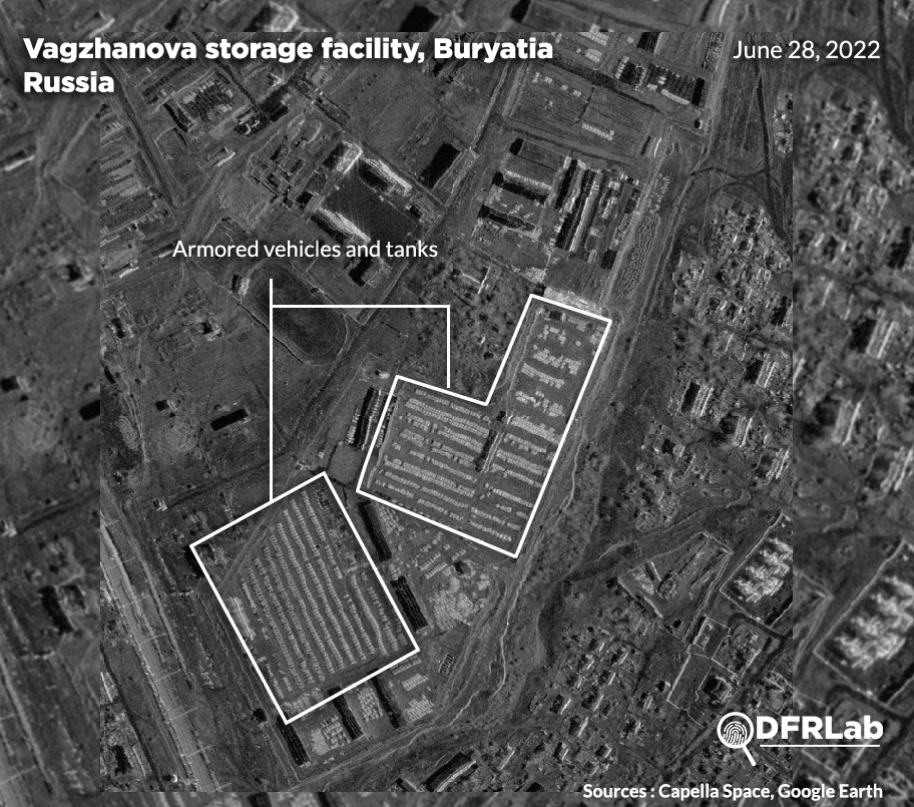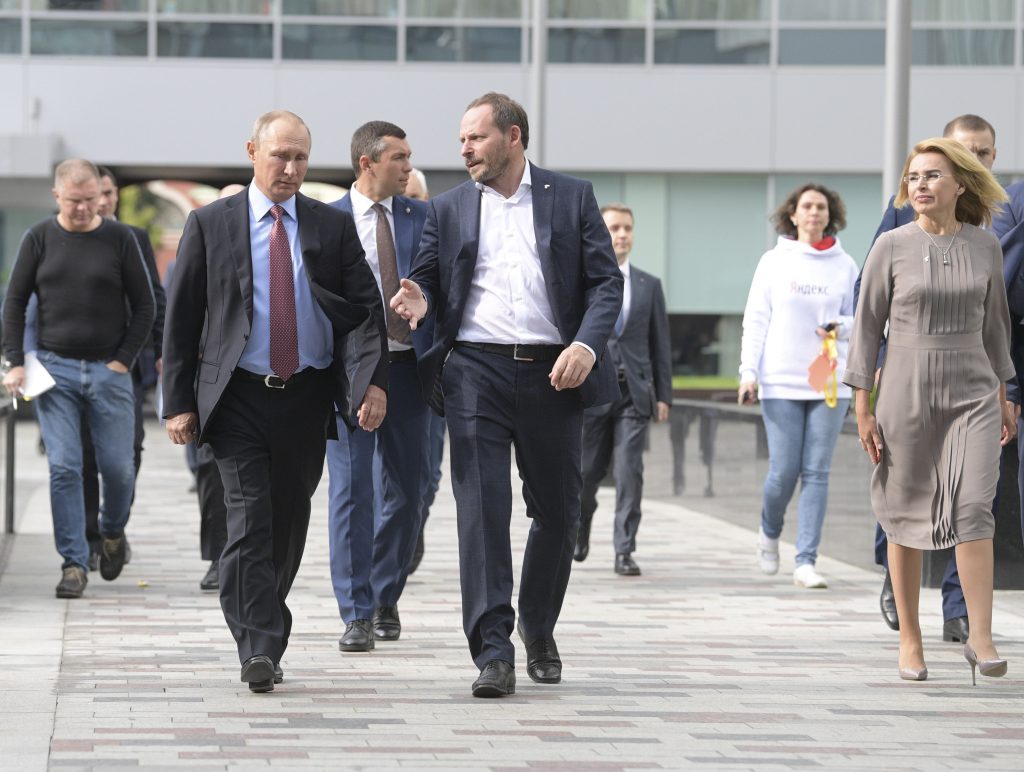
Russian War Report: Co-founder of Russia’s most popular search engine condemns war in Ukraine

As Russia continues its assault on Ukraine, the Atlantic Council’s Digital Forensic Research Lab (DFRLab) is keeping a close eye on Russia’s movements across the military, cyber, and information domains. With more than seven years of experience monitoring the situation in Ukraine—as well as Russia’s use of propaganda and disinformation to undermine the United States, NATO, and the European Union—the DFRLab’s global team presents the latest installment of the Russian War Report.
Security
Russian oil tanker struck as Ukrainian general alleges chemical weapons use
Satellite imagery supports report of depleted armored vehicles in Russian military storage facility
Tracking narratives
Yandex co-founder condemns Russia’s war in Ukraine
Russian oil tanker struck as Ukrainian general alleges chemical weapons use
Russia accused Ukraine of striking a Russian oil tanker on August 4 with a naval drone. The vessel was identified by the Moscow Times as the chemical tanker SIG, currently under US sanctions for supplying jet fuel to Russian forces in Syria. Ukrainian media outlet Suspilne, citing unnamed Ukrainian security officials, reported that the Ukrainian navy struck the ship near the Kerch Strait Bridge using a naval drone. Ukrainian forces have long targeted the Kerch Bridge in an attempt to cut off Russian military logistics in southern Ukraine. On the night of August 3, Ukrainian troops conducted a series of aerial and naval drone strikes against Russian logistics and seaside infrastructure in occupied Crimea and Russia’s Krasnodar region, reportedly striking the Russian Ropucha-class landing ship Olenegorsky Gornyak.
The General Staff of the Ukrainian Armed Forces announced on August 7 that it conducted offensive operations in the direction of the Russian-occupied cities of Berdyansk and Melitopol. Ukrainian Deputy Defense Minister Hanna Maliar said that fighting is ongoing south of Bakhmut. The Ukrainian army is making progress on this front, albeit slowly. Ukrainian President Volodymyr Zelenskyy acknowledged in an interview published on August 6 with Argentine newspaper La Nacion that counteroffensive operations are progressing slower than expected and mentioned the need for patience.
Meanwhile, Ukrainian General Oleksandr Tarnavskyi alleged on August 6 that Russian forces used chemical weapons in Ukraine, violating international conventions. According to a post on Tarnavskyi’s Telegram channel, Russian troops fired two artillery barrages with munitions containing the toxic compound chloropicrin in Novodanylivka. Tarnavskyi did not include evidence to back up his claim, nor has it been independently verified.
On the evening of August 7, Russian forces reportedly dropped four guided aerial bombs on the village of Kruhliakivka, located twenty-five kilometers southeast of Kupiansk. According to Governor Oleh Syniehubov, the attack killed two civilians; and Russia struck the village again when first responders arrived on the scene. That same day, Head of the Office of the President of Ukraine Andriy Yermak said that Russia struck a house in the town of Kucherivka, Kharkiv Oblast, killing two people. In addition, a man was reportedly killed during a Russian attack in Nikopol, located across the Dnipro River from Russian-controlled Enerhodar in Zaporizhzhia Oblast.
On August 6, Zelenskyy said that over the past week, Russian forces had launched sixty-five missiles against Ukraine and 178 combat drones, including eighty-seven Iranian-made Shahed drones. Meanwhile, the Ukrainian air force reported that Russian troops used Kinzhal ballistic missiles against Ukraine on August 5, targeting central and western regions.
According to Ukraine’s Ministry of Culture and Information Policy, Russia has damaged at least 763 cultural heritage sites in unoccupied regions of Ukraine since February 24, 2022. The most damage has been recorded in Kharkiv, Donetsk, Kherson, Kyiv, and Odesa. At least 255 architectural landmarks, 185 historical sites, nineteen monumental art sites, and eighteen sites of archeological significance are reportedly among the damaged locations.
—Ruslan Trad, resident fellow for security research, Sofia, Bulgaria
Satellite imagery supports report of depleted armored vehicles in Russian military storage facility
In an August 8 article, the Moscow Times claimed that a Russian open-air storage facility dedicated to tanks and armored vehicles in the Vagzhanova district of Buryatia’s capital city, Ulan-Ude, had been depleted of almost 40 percent of its units since June 2022. The outlet based its claims on Google Earth imagery, with the May 2023 update showing empty spots where tanks used to be located. The DFRLab compared the Google imagery to Capella Space satellite aperture radar (SAR) imagery, which also appears to show that many armored vehicles and tanks in storage at the Vagzhanova facility had been relocated. The SAR imagery only covers the area from June to November 2022.

According to the Moscow Times’ estimates, in September 2021, the storage facility stored 3,840 armored vehicles. The figure shrank to around 2,600 units in November 2022, and the latest Google Earth imagery points to around 2,270 remaining units. The Moscow Times also indicated that around 1,570 units were missing from the storage facility, with the most significant departures observed after the enforcement of the partial mobilization in late May 2022.
Using measurement tools on satellite imagery, the DFRLab can infer that based on the length and width of the vehicles in the imagery, the tanks could be identified as the BTR-RD, BMD-4M or BMD-3, and BTR-MD (codename: “Rakushka”). The Moscow Times reported that military units 4428 and 46108 are deployed to the Vagzhanova military facility.
The armored vehicles cited above also appear consistent with losses reported by open-source researcher Oryx during the February 2023 battle of Vuhledar, which saw heavy Russian losses. According to Oryx’s estimates, twenty-one BTR-MD tanks were destroyed or captured during the failed offensive. The DFRLab also monitored the failed Russian push on Vuhledar, which highlighted the presence of Russian soldiers from Russia’s far-east regions, including Primorsky Krai and Buryatia. Both regions have suffered heavy fatalities since the Russian invasion of Ukraine.
At the time of writing, the DFRLab cannot confirm that these units were equipped with the vehicles presented in the satellite imagery dating back to November 2022.
Citing Russian defense ministry instructions, the Moscow Times also reported that armored vehicles stored in open-air facilities are typically part of the least valuable units, as more modern vehicles are stored in protected facilities or under tents.
—Valentin Châtelet, research associate, Brussels, Belgium
Yandex co-founder condemns Russia’s war in Ukraine
After independent Russian news outlet Agenstvo reported that Arkady Volozh, co-founder of the search engine and tech company Yandex, did not describe himself as Russian in his official website bio, Volozh reportedly issued a statement voicing opposition to the war in Ukraine and acknowledged his “share of responsibility.”
“I am categorically against Russia’s barbaric invasion of Ukraine, where I, like many, have friends and relatives,” the statement noted. “I am horrified by the fact that every day bombs fly into the homes of Ukrainians. Despite the fact that I have not lived in Russia since 2014, I understand that I also have a share of responsibility for the actions of the country.”
Independent outlets, including Meduza and Proekt, have previously published articles critical of Volozh and Yandex, alleging that both have been complicit in Russia’s crackdowns on internet freedoms. “Over time, it became clear that Russia was in no hurry to become part of the global world,” the statement added. “At the same time, the pressure on the company grew. But we did not give up, we did our best despite the external conditions. Has it always been possible to find the right balance? Now, looking back, it is clear that something could have been done differently.”
On August 7, Agenstvo raised questions about how Volozh presented himself to the world, noting that his official bio describes him as a “Kazakhstan-born, Israeli tech entrepreneur, computer scientist, investor, and philanthropist.” Agenstvo also noted a back-and-forth series of edits on his Wikipedia page in which an IP address located in Israel had removed the phrase “Russian billionaire.”
“There were many reasons why I had to remain silent,” the statement concluded. “You can argue about the timeliness of my statement, but not about its substance. I am against war.”
—Andy Carvin, DFRLab managing edtior, Washington, DC
Russian independent outlet ties Investigative Committee of Russia to forced deportations of Ukrainian children
Russian independent media outlet Verstka reported that the Investigative Committee of Russia and its head, Alexander Bastrykin, are allegedly involved in the forced deportation of Ukrainian children to Russia. In a special report published on August 6, Verstka claimed that the Investigative Committee of Russia took patronage over the Ukrainian children living in Russia and sent its employees to homes with toys, clothes, and school materials.
Verstka also claimed that the Investigative Committee previously advertised the cadet corps to Ukrainian children from eastern Ukraine. According to data published in an Investigative Committee magazine, at least seventy-eight Ukrainian children entered Russian educational institutions, including the cadet corps and academies affiliated with the Investigative Committee, between February 2022 and March 2023.
Bastrykin does not appear to have commented on the allegation; the Russian War Report will continue to keep an eye on this story in case he issues a statement.
—Ruslan Trad, resident fellow for security research, Sofia, Bulgaria
Image: Russian President Vladimir Putin (L) listens to Arkady Volozh, Chief Executive Officer of Yandex, as he visits the headquarters of the company in Moscow, Russia September 21, 2017. Sputnik/Alexei Druzhinin/Kremlin via REUTERS ATTENTION EDITORS – THIS IMAGE WAS PROVIDED BY A THIRD PARTY.
